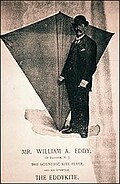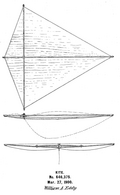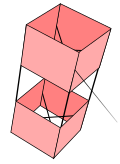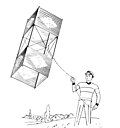Difference between revisions of "AY Honors/Kites/Answer Key/es"
(Created page with "{{clear}}") |
(Created page with "{{clear}}") |
||
| Line 41: | Line 41: | ||
{{clear}} | {{clear}} | ||
| − | + | {{clear}} | |
:''"When rain has wet the kite twine so that it can conduct the electric fire freely, you will find it streams out plentifully from the key at the approach of your knuckle, and with this key a phial, or Leiden jar, maybe charged: and from electric fire thus obtained spirits may be kindled, and all other electric experiments [may be] performed which are usually done by the help of a rubber glass globe or tube; and therefore the sameness of the electrical matter with that of lightening completely demonstrated."'' | :''"When rain has wet the kite twine so that it can conduct the electric fire freely, you will find it streams out plentifully from the key at the approach of your knuckle, and with this key a phial, or Leiden jar, maybe charged: and from electric fire thus obtained spirits may be kindled, and all other electric experiments [may be] performed which are usually done by the help of a rubber glass globe or tube; and therefore the sameness of the electrical matter with that of lightening completely demonstrated."'' | ||
Revision as of 17:57, 27 January 2021
| Cometas | ||
|---|---|---|
| Asociación General
|
Destreza: 1 Año de introducción: 1986 |
|
Requisitos
|
La especialidad de Cometas es un componente de la Maestría Recreación. |
1
- "When rain has wet the kite twine so that it can conduct the electric fire freely, you will find it streams out plentifully from the key at the approach of your knuckle, and with this key a phial, or Leiden jar, maybe charged: and from electric fire thus obtained spirits may be kindled, and all other electric experiments [may be] performed which are usually done by the help of a rubber glass globe or tube; and therefore the sameness of the electrical matter with that of lightening completely demonstrated."
2
Kites are used today for the following:
- Predicting weather (carrying aloft meteorological instruments).
- Carrying loads of water ?
- Spaceflight (during the recovery of space vehicles)
- Pulling ships at sea
- Recreation (kite surfing and skateboarding)
3
The kites get a lift from the wind in the sky. The same current of air keeps them in flight up in the sky. The higher the kite gets the stronger the current usually gets and the longer your kite will stay up in the air. Flying Kites is something that people enjoy all over the world! Air has weight. When a current of air hits an obstruction this weight is known as force. A kite, at the correct angle to the airstream, has this force translated into lift and drag. This angle is about 10 degrees and is the angle at which an airplane wing is most efficient.
4
4a
The center rod, or other rods that run lengthwise down a kite. May also be called a longeron. Sled kites and Conyne deltas have more than one.
4b
The sticks used as the frame of a kite.
4c
The vent re-directs the airflow over the sail and may help to lift or stabilize the direction of the kite.
4d
The bowstring is tied from each end of a spar, making the spar bow-shaped, and gives the kite its dihedral
4e
Or sail; the cloth or lifting part of a kite.
4f
The frame makes the shape of the kite
4g
The tail is a length of material such as cotton, nylon or plastic which is attached to the kite for visual effect or to cause drag (on a single line kite) that helps with directional stability.
4h
The keel is a triangular piece of cloth used in lieu of or as well as a bridle. It helps with directional stability just like the keel of a boat.
4i
Or Tether What a person holds on to, to control the kite. The link between the kite and the ground.
4j
Lines that form the junction between kite and flying line. The bridle transmits the commands of the pilot to the kite. The bridle may also be the means of giving shape to the kite, in the case of soft kites.
4k
The reel contains, and is used to let out or retrieve, the flying line.
4l
Dihedral is the angle formed by the lateral extremities of the kite to the horizontal; and stabilizes the line of flight. Alternatively, a bend or curve in the kite that helps keep the kite stable
5
- Lack of wind.
- Too strong a wind.
- Trees or other obstacles causing turbulence.
- Essential parts of the kite or line breaking (e.g., too powerful a wind can break spars or the kite string).
6
The usual causes of a kite looping are:
- Not enough di-hedral.
- Poorly bridled.
- Poorly balanced.
- Too much wind.
If the kite starts to misbehave when already aloft the problem is most likely to be too much wind. Release tension on the line and try to pull the kite diagonally out of the wind-window and closer to you. The closer you have it, the more control of it you will have too. Most importantly you must keep the kite under your control.
7
A kite's tail is used to add stability to the kite and keep it facing into the wind. If there is enough di-hedral this will then prevent the kite from looping. The length of a tail should be from six to nine times the length of the kite body. Some put them on the kite so that when in the air it will wave along the wind - for decoration.
8
- Never fly a kite when it's raining and lightning - lightning can kill or cause serious burns.
- Do not fly a kite near roads, or cars - distracting a car driver is dangerous, you could cause an accident.
- Do not fly near power lines - you could be killed by an electric shock.
- Do not fly near people or animals - the spine is an arrow traveling at up to 90 MPH.
- Keep away from buildings and trees - trees eat kites!
- Do not fly within 3 kilometres (two miles) of an active airport or aerodrome. See your local aviation authority for details.
9
9a
Winding a kite line onto a straight stick without getting a large number of twists and knots onto the line is not easy, and care must be taken. First of all get a piece of straight stick about 15-20 cm![]() long. Tightly fasten the end of your kite line securely to the center of the stick using two half hitches so that the line can not slide round the stick; then wind several turns tightly onto the center over your knot. Now wind the remainder of your kite line onto the stick using a figure of eight motion; looping your line over each end in turn, and letting it lie neatly close to the center turns; whilst doing this gradually rotate the stick so that the line does not bunch up in one place. The figure of eight motion is imperative as it puts a reverse twist on at each turn. If you do this carefully; all that you have to do to let line out is to hold the center of the stick/ball of line and let the line off each end of the stick in turn. A word of caution – hold fast to the 'winder'. If the tug of the kite pulls it out of your hand, you may find yourself running down-wind chasing a bouncing stick.
long. Tightly fasten the end of your kite line securely to the center of the stick using two half hitches so that the line can not slide round the stick; then wind several turns tightly onto the center over your knot. Now wind the remainder of your kite line onto the stick using a figure of eight motion; looping your line over each end in turn, and letting it lie neatly close to the center turns; whilst doing this gradually rotate the stick so that the line does not bunch up in one place. The figure of eight motion is imperative as it puts a reverse twist on at each turn. If you do this carefully; all that you have to do to let line out is to hold the center of the stick/ball of line and let the line off each end of the stick in turn. A word of caution – hold fast to the 'winder'. If the tug of the kite pulls it out of your hand, you may find yourself running down-wind chasing a bouncing stick.
My own personal preference for a single line is to use a 'reel' but again the line must be put onto the reel by rotating the reel and not by holding the reel still; whilst looping the line over the periphery. The latter action puts a twist into the line with each turn, and with cheap line can undo the manufacturer's spinning.
Here are a couple of external links, Which give some help in winding dual lines onto commercial winders.
- http://www.expertvillage.com/video/3991_winding-kite-string.htm
- http://www.ehow.com/video_4412142_how-wind-kite-string.html
9b
Adventist Youth Honors Answer Book/Knot/Fisherman's bend
Note:- This is a quick and easy knot with which to fasten two ends of line. Unfortunately the weakest part is now the knot which is approximately 45 percent of the line strength. A better knot which gives a finished strength of approximately 60 percent of the line strength is the 'riggers bend' or 'hunters bend' [1]
10
Here are several links to making different types of kites. Go have fun!
10a
The sled kite was invented and patented by the American, William Allison in the 1950s. This kite helped pave the way for a class of kites known as "semi-rigid."
10b
Note: There is no such thing a "stable, flying, flat kite." The nearest thing to this is probably the "Indian fighter kite" as it is flat until on the wind. It is a single line kite and is allowed to rotate and float down wind, until it is pointing in the desired direction. At this time the line is pulled tight and the bridle pulls the spine forward into the wind and the kite then assumes its dihedral, stops rotating and leaps forward under the pilot's control. The profile of this kite is almost square while the two-stick frame lies on a flat plane, with the flexible cross spar (complete with both ends tapered) is bent backwards towards the tail end. Traditionally, the covering of this kite is tissue paper but more recently for the western market is made with mylar or similar thin plastic.
Another kite which qualifies for the term "flat" is the Delta kite, made with, or without a spine. It depends for its stability on the pull of the line on its bridle shaped keel to deform the sail and give it its dihedral. We do not know when it was invented, but it is a possible contender for Benjamin Franklin's flat kite. Its one fault is that it has a tendency to fly directly over the head of the pilot, and beyond. This fault is cured by the addition of a tail or a drogue.
10c
Diamond kites (see Eddy kites, but distinguish). Diamonds types appear from mini to very large, from low-cost beginner utility to high quality state-of-the art large target control diamonds.
The classic Diamond is also a flat kite until on the wind, but here the dihedral is forced onto the cross spar by the air flow. The cross spar lies at ninety degrees to the spine, and is spaced between one fifth and a quarter of the distance from the nose. The addition of a tail (of from six to nine times the body length) compels the kite to face into the wind.
- http://www.skratch-pad.com/kites/make.html
- http://www.diynetwork.com/diy/hobbies/article/0,2033,DIY_13951_2273218,00.html
10d
See the earlier note under "Flat kites" as the Delta wing is flat until on the wind. As with most kites, the more accurately one half of the flying surface reflects the other, the easier it is to get it to fly true. The Delta is named after the Greek letter which it resembles in shape, if constructed without a spine. If a spine is added the profile can be altered to achieve the shape designer wishes.
By adding yet another spine and another keel, plus a strip of material between the kite is now called Delta Conyne.
- External Site to make Delta Conyne Wing Kite - http://www.kitemonger.com/kiteplan/sbd/index.html
10e
The Malay kite is a model of tailless kite. First introduced to the West in a New York newspaper article from October 1894, the Malay kite was used for recreation for centuries before this in parts of the Far East. The article detailed how a university professor ("Clayton") had erected a series of kites and bound them all together to one kite. These kites had no tail, were bowed and diamond shaped, and were referred to by the article writer as "Malay kites". However, the existence of a Malay-like design may have already been heard of in the United States sometime before the publishing of the article; in the last edition of the American Boy's Handy Book, another tailless kite is described (there referred to as a "Holland" kite). The description of this kite, which was to be included as a chapter in the book, was sent in to the author sometime around 1882, eleven years before the Malay kite was mentioned in the newspaper. Note:- to make the 'Malay' or 'Eddy' kite fly "tail less" dihedral is applied to the kite by fitting a bowline to the cross spar in like manner to that used on the Eddo, Korean, and Rocacoo. The pre-application of bow onto the cross spar is the main difference between the classic diamond and the Eddy. The other difference is that the bow enables the Eddy to fly without a tail. which the classic 'Diamond' requires.
10f
A box kite is a high-performance kite, noted for developing relatively high lift. The typical design has four parallel struts. The box is made rigid with diagonal crossed struts. There are two sails, or ribbons, whose width is about a quarter to one third of the length of the box. The ribbons wrap around the ends of the box, leaving the ends and middle of the kite open. In flight, one strut is the bottom, and the bridle is tied between the top and bottom of this strut. The dihedrals of the sails help stability. Note:- The central gap between the sails is essential, as the air flow passing around both the inside and outside of the rear 'ribbon' has a stabalising effect and seems to give the kite more 'lift' or elevation.
- This one's a bit involved - http://www.howtomakeandflykites.com/kites-to-make/the-box-kite.html
10g
A tetrahedral kite is a multi-celled rigid box kite composed of tetrahedrally shaped cells. The cells are usually arranged in such a way that the entire kite is also a regular tetrahedron. The kite can be described as a compound dihedral kite as well.
This kite was created by Alexander Graham Bell. It came about from his experiments with Hargrave's Box Kites and his attempts to build a kite that was big enough to carry both a man and a motor. Bell wrote about his discovery of this concept in the National Geographic June 1903 issue; the article was titled "Tetrahedral Principle in Kite Structure".
This style kite, while not an easy kite to make compared to the simple cross kite, is a very stable kite and is easy to fly. It flies well in moderate to heavy winds if it is properly set up.
- http://www.instructables.com/id/Tetrahedral-Kite/
- http://www.cit.gu.edu.au/~anthony/kites/tetra/straw_plan/
References
- Categoría: Tiene imagen de insignia
- Adventist Youth Honors Answer Book/Honors/es
- Adventist Youth Honors Answer Book/es
- Adventist Youth Honors Answer Book/Skill Level 1/es
- Categoría: Libro de respuestas de especialidades JA/Especialidades introducidas en 1986
- Adventist Youth Honors Answer Book/General Conference/es
- Adventist Youth Honors Answer Book/Recreation/es
- Adventist Youth Honors Answer Book/Recreation/Primary/es
- Adventist Youth Honors Answer Book/Stage 0/es
- Adventist Youth Honors Answer Book/Recreation Master Award/es
- Adventist Youth Honors Answer Book






